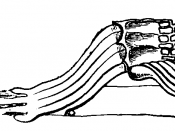Scientists claim that water = H2O. Suppose that a neuroscientist claimed that pain = the firing of c-fibres. How would a functionalist argue against the neuroscientist's claim? What does this dispute reveal about the essence of mental states?In the dispute about the essence of mental states, the two main standpoints are identity theory, the belief that mental states have a substantial essence; and functionalism, the belief that the essence is functional. In this essay I will be assessing each of the claims made by functionalists arguing against the neuroscientistÃÂs claim that pain is the firing of c-fibres. I will thus disprove these arguments, concluding how this dispute reveals that the essence of mental states is substantial.
Functionalists define the essence of mental states as functional, stating that that mental states are ÃÂwhatever states take (or are supposed to take) a creature from environmental input to behavioural output, no matter what they are made out of.ÃÂ
Pain, for instance, is an internal state that is typically caused by bodily damage, and typically causes the desire that it ceases along with behavioural responses that typically attempts to minimize the damage.
The neuroscientistÃÂs claim would be classified as an identity theory or physicalism. Identity theory is definitively materialistic; keeping that the connection between mind and body is identity: the mind is the brain, and therefore, mental states are states of the brain. I now will outline three arguments made by functionalists against this theory ÃÂ the concepts of Martian pain, prosthetic p-fibres and dolphin pain.
Martian pain is a thought experiment deliberated by David Lewis in his paper ÃÂMad Pain and Martian PainÃÂ. He describes a Martian with a brain and different bodily make-up who, lacking c-fibres that when pinched, still writhes and groans as a reaction to the inflammation of cavities on his feet. Lewis states that we cannot doubt that this Martian is in pain, though identity theory claims that he cannot be, considering he does not have c-fibres.
The prosthetics or ÃÂp-fibresÃÂ argument creates a situation where a personÃÂs neural c-fibres have been replaced by prosthetic p-fibres which act in the same way, causing the person to behave when pinched as she would if she still had c-fibres. This argument attempts to claim that although she lacks c-fibres, she is obviously still feeling pain, therefore proving that the essence of her mental state (pain) is functionalist.
Dolphin pain is the third argument constructed against identity theory. Functionalist tell us to consider, that if dolphinsÃÂ neural assembly where to differ from that of humans, and that instead of c-fibres they have d-fibres. These d-fibres also act in the same way as c-fibres and that to determine if a dolphin is in pain we just do so by judging its behavioural outputs instead of searching for the non-existent c-fibres. Essentially, it is the role played, not the actor that matters for being in pain.
But the identity theorist cannot allow both that pain = C-fibres firing, and that pain = D-fibres firing. This would, ÃÂby the transitivity of identity, lead to the false contention that C-fibres firing = D-fibres firing.ÃÂ As a result,Identity theorists must restrict themselves to ÃÂPain in humans = C-fibres firingÃÂ and ÃÂPain in dolphins = D-fibres firingÃÂ. The question of what humans in pain and dolphins in pain have in common would remain, of course, for they would not ex hypothesi share the same kind of brain state. And the identity theoristsÃÂ answer must be that what they would have in common would be that each has a state inside them playing the pain-role, although not the same state.
In different ways of filling in the relativity to population maybe said to yield different senses of the world ÃÂpainÃÂ, then we plead ambiguity. The madman is in pain in one sense, or relative to one population, the Marian is in pain in another sense, or relative to another population.
Functionalists argue that pain cannot be merely be defined by the firing of c-fibres in the brain, as this claim is chauvinistic. They claim that such mental states (pain) should be defined by their functional output instead of the material processes within the brain, i.e. if two beings exhibit the same reaction from the same stimuli, they must be experiencing the same mental state.
Environmental Input (A) -> Mental State (B) ->Behavioural Output (C)So if A1 = A2 and C1 = C2 then by definition, functionalists claim that B1 = B2. The dispute between identity theorists and functionalists lie here within the assumption about the essence of B. Functionalists claim that identity theory is chauvinistic because their definition of pain is too narrow and exclusive and therefore undoubtedly disregards the definite existence of the pain of Martians, people with prosthetic neural fibres and dolphins. On the other hand, identity theorists claim that the functionalistsàclaim that mental states are governed by behavioural outputs gives an overtly broad acceptance of the same mental states, and thatSo with this dispute, the essence of mental states can be defined as substantial, with doubt cast upon the functionalismÃÂs view that they are governed by functional behaviour.âÂÂBibliography1.JACKSON, FRANK. ÃÂMind, identity theory ofÃÂ, in E. Craig (Ed.), Routledge Encyclopedia of Philosophy. London: Routledge, 1998. From: http://www.rep.routledge.com/article/V0162.LEVIN, JANET. "Functionalism", The Stanford Encyclopedia of Philosophy (Summer 2009 Edition), Edward N. Zalta (ed.). From: http://plato.stanford.edu/archives/sum2009/entries/functionalism/3.LEWIS, DAVID. ÃÂMad Pain and Martian PainÃÂ, in Rosenthal (ed.), The Nature of Mind. Oxford University Press, 19914.PAPINEAU, DAVID. ÃÂFunctionalismÃÂ, in E. Craig (Ed.), Routledge Encyclopedia of Philosophy. London: Routledge, 1998. From:http://www.rep.routledge.com/article/V0155.RUSSELL, LUKE. ÃÂMind & Morality Lecture 8: Essences and FunctionsÃÂ6.RUSSELL, LUKE. ÃÂMind & Morality Lecture 9: Qualia & Artificial IntelligenceÃÂ





